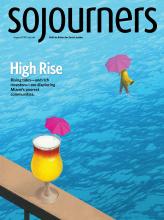THIS MONTH WE HEAR ABOUT God’s alluring wisdom, personified as the ultimate hostess, who invites us to a banquet in her glorious home with its seven pillars. The passage from Proverbs 9 always reminds me of an unforgettable moment in Lawrence of Arabia’s Seven Pillars of Wisdom. Once when he was in the desert, taking water from a spring, Lawrence saw coming toward him “a grey-bearded, ragged man, with a hewn face of great power and weariness.” When this man drew near the spring, he shut his eyes and then groaned aloud, “The love is from God; and of God; and toward God.”
This pronouncement would be a perfect summation of the “mystical core of the gospel,” worth holding in our hearts as we hear about Jesus as the bread that comes down from heaven and gives life to the world. Other scriptures will speak of the endemic folly that disconnects people from this love, of the new patterns of behavior that stem from embracing the saving love of God that reaches into our predicament to liberate us through Christ. It can remind us that the complaining pitilessly recorded in the Exodus narratives and the hostile reception to Jesus’ claim to be the authentic food and drink from God really stem from our fear of true intimacy with God, fear of becoming caught up in the love that is of God and returns to God with and in Christ.
[ August 5 ]
A Satanic Cloud
Exodus 16:2-4, 9-15; Psalm 78:23-29; Ephesian 4:1-6; John 6:24-35
THE TENDENCY OF churches to make our worship “lite” in the summer becomes harder to justify this Sunday. We worship under the cloud of the anniversary of the U.S. bombing of Hiroshima, Japan, on Aug. 6, 1945, the horror that ushered in our nuclear age. We have gotten used to our “sane” leaders coolly considering the conditions in which they would unleash weapons that could make our—God’s—earth uninhabitable. Ours is a self-imposed wilderness exile in which, for those who are brave enough to look up, this lurid, satanic pillar of cloud by day and pillar of fire by night continually looms ahead, drawing us toward self-destruction.
Read the Full Article

